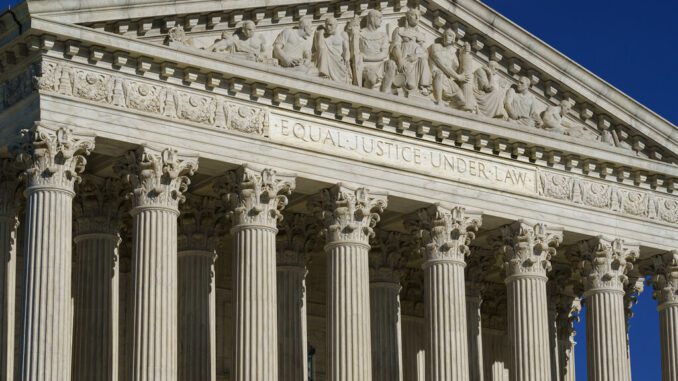
This past Wednesday, the United States Supreme Court heard oral arguments in Dobbs v. Jackson Women’s Health Organization. In the case, Mississippi is seeking Court approval on a law that would ban abortion after 15 weeks, but Mississippi also argues Roe v. Wade itself should be reversed by the Court. It appears there are six votes on the Court for gutting Roe and five for reversing it altogether. One must remember that in major cases like this, the justices of the Court need no persuasion from the lawyers. Instead, it is through the lawyers that the justices have an initial conversation with each other about the case.
Chief Justice Roberts, who is pro-life but also the chief justice, takes a restrained view of reversals. He sees it as his duty to protect the Court. He wants to end the so-called “viability standard” the Court maintains that prohibits banning abortion prior to the nebulous point of fetal viability. Roberts seemed to argue that 15 weeks is fine as a standard. Justices Elena Kagan and Neil Gorsuch suggested such a standard would not work. Gorsuch, along with Samuel Alito, Brett Kavanaugh and Clarence Thomas seem fully prepared to end Roe. The newest justice, Amy Coney Barrett, was more obtuse, but seemed inclined to end Roe, though possibly inclined to just gut it with Roberts.
The chief problem with Roe v. Wade is that no one can find it in the Constitution. In fact, Roe is not just one degree removed from the Constitution, but two degrees away from the Constitution. To get to Roe, one must first get through Griswold v. Connecticut, which found that within the right to privacy was a marital right of privacy. It removed privacy to the penumbras of the constitution. Only from there can one get to Roe.
One can fairly well gather from the Constitution’s Fourth and Fifth Amendments that there is a right to privacy of some kind. Griswold finds an explicit right to marital privacy related to, for example, the use of contraception, within that right to privacy. Roe then goes a step further to find, as a right to privacy, a woman’s right to kill her unborn child.
No reasonable reading of the Constitution suggests that right exists within the Constitution and almost all states had bans on abortion when those states ratified the 14th Amendment. The plain reading of the Constitution suggests no abortion right at all, let alone one broken down into trimesters: no state can ban abortion in the first; states can impose restrictions during the second; states can prohibit in the third with reasonable exceptions. The subsequent case of Casey v. Planned Parenthood moved the standard from trimesters to viability.
Where the Constitution is silent, the 50 states are supposed to speak. Each state should be able to set its own laws regulating abortion. Seven men on the United States Supreme Court, in 1973, conjured up a right to an abortion within the penumbras of other penumbras of various amendments to the Constitution. The late Justice Ruth Bader Ginsburg acknowledged the shoddiness of the decision even as she supported the right to kill children.
Roe takes the Constitution, a document written so American citizens could understand their rights and government, and hands it over to a professional class of life-tenured judges and lawyers who can conjure at will their coveted requests from the constitutional framework. We are, with Roe, a nation of judges and lawyers, not men and women. It began a series of cases that separate citizens from the Constitution, requiring a near-divine and always infallible intermediary in a black robe to tell the citizen what his Constitution actually says.
With the Second Amendment, the average citizen can ascertain the right of gun ownership in America. With abortion, no citizens not trained in the dark arts of liberal legal interpretation and how to read the breath of a living piece of paper can even understand and so can never truly respect the rule of law. The law becomes not the compact of governance, but the possession of the great “Says Who” — who says what the law is, regardless of what the law plainly means.
It is time to reverse Roe.



